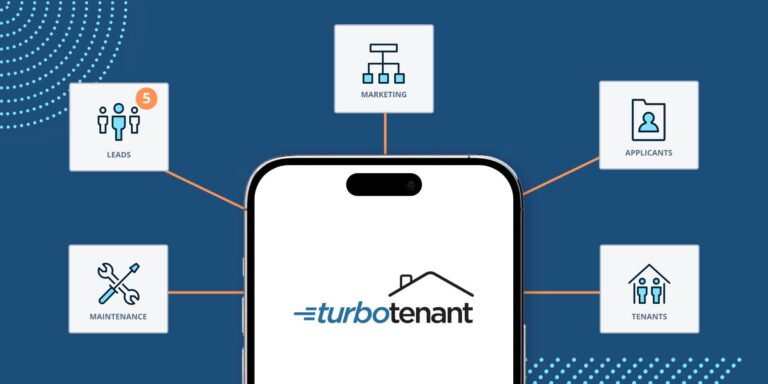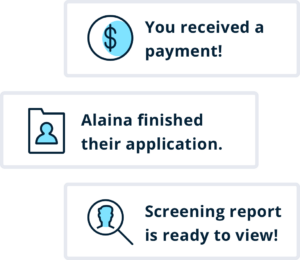9 min read
How to Get Property Management Clients (Lead Gen Methods)
With such a competitive and fast-paced real estate market, especially rental markets, knowing how to get property management clients is crucial for starting and...

Most landlords have to be in a number of places at once.
Some work full-time outside of their landlord duties and others have many units that often need attention all at once. The good news is that most landlords carry cell phones, meaning the best landlord app can help them be in two places simultaneously.
Whether you’re meeting with a contractor or attending a showing, apps enable landlords to stay connected and handle important tasks from anywhere. No more missed calls or neglected issues.
To streamline your workflow, we analyzed three landlord apps to determine which stands out. In making our determination, we examined what makes a good landlord app, the top choices available, and critical features you should insist on when making your selection.
Good landlord apps are more than just a collection of features. They’re comprehensive property management software solutions that cover all aspects of managing your rentals. While you may not be looking for an all-in-one solution now, wide-ranging apps make a lot of sense compared to those that only fill a need or two.
The reasoning is pretty simple. Adopting existing features that an app already offers is easier than switching all your properties, tenants, and data to a new one once you outgrow a particular service.
With that in mind, let’s examine the top features to consider when choosing a landlord app.
Apps must be easy to use — that’s their whole appeal. You shouldn’t have to dig through menus and subfolders to access critical functionality. Instead, landlords should find what they want at a glance and complete tasks just as fast.
The ability to set up a listing that includes photos, the number of beds and baths, square footage, lease lengths, rent, security deposit amounts, and more from a single interface and then market it on popular listing sites helps reduce vacancies.
Once you have a great listing, interested parties will come knocking. The best landlord apps centralize all your interested parties while providing you with the means to send pre-screeners and invitations to apply.
Time-consuming tenant screening tasks are worth doing well so you move a great tenant into your rental. With the right app, landlords can conduct thorough tenant screening by assessing financial, criminal (where allowed), and eviction checks without leaving the app.
A comprehensive landlord app must enable digital lease creation with e-signature integration, automated lease tracking, reminders, compliance support tools, and seamless document storage, ensuring efficient lease agreement management.
Collecting rent is one of the most critical features to look for. Apps that provide the tools to set up monthly charges, remind tenants when to pay, and track payments make landlording easier. Then, integrations take it a step further by streamlining rent payment accounting. With the right tools, rent payments automatically sync to accounting platforms.
With the right app, landlords can create requests directly from their smartphones. From there, they can fix the issue themselves if they want to go the DIY route, or some services even enable remote landlords to hire contractors to come and do the work with a budget in mind.
Landlord apps that take advantage of smartphone cameras make a lot of sense. With this feature, landlords can simply shoot photos of receipts to track expenses easily. When paired with accounting software, expenses filter into the software so you never forget them.
We chose the following apps because they provide critical functionality to landlords while being easy to use. Some have more features, but they all help landlords get more done from their phones.

It probably won’t surprise you that we chose TurboTenant as the best landlord app in 2024.
From the first login, you’ll notice that TurboTenant is incredibly easy to use. The dashboard provides quick access to essential features, including property marketing, lead management, applicants, tenant screening, and more.
Once you decide what you want to work on, with just a few taps, you’ll be well on your way to handling tasks that normally require more than a single app or website to complete. And the best part is you can use critical features in TurboTenant absolutely free — no expiring trials or credit cards to deal with.
Compared with TurboTenant’s landlord app, Stessa’s mobile app focuses primarily on accounting and financial functionality. That’s not to say it doesn’t include property management functions like rent collection, lease management, and document storage, but Stessa designed the app with an accounting focus.
A quick look illuminates their imperative. It displays metrics like:
Compared to TurboTenant, you won’t find maintenance management, lease agreement generation, tenant communication, or quick access to showing scheduling features.
However, if your main concern is rapidly accessing charts and graphs showing your financial information, you may want to consider Stessa’s landlord app. For more information, see our comparison of Stessa vs. TurboTenant.
Landlordy doesn’t have a web component like the previous apps, so you can only access its features via its mobile app.
That could hinder some landlords who want to access their properties on a larger device, though Landlordy is available on iPads and tablets. In short, if you wish to manage from your phone or tablet, you’ll find that Landlordy provides the following features:
The most significant difference between Landlordy and the other options on this list is that it’s a bit like old-school software. You install Landlordy on your device and pay once, and then the app stores most data locally on the device. However, some data may be sent to iCloud.
This device-centric approach may benefit landlords who are wary of the cloud. Because Landlordly doesn’t transmit landlord-or-renter-specific data to remote servers, you don’t need to worry about data getting compromised in transit to the cloud. However, it is worth noting that TurboTenant and Stessa use industry-standard security processes to protect your data both while it’s stored and while it’s in transit to the cloud.
But Landlordy’s approach to security is a double-edged sword. Landlordy isn’t cloud-based, so automations enabled by the cloud won’t happen with Landlordy. For example, tenants can’t pay rent via an ACH transfer from their renter app and have that payment reflected in the landlord app.
The same goes for tenant-submitted maintenance requests and tenant screenings, and you can’t submit property listings to dozens of listing sites.
Ultimately, Landlordy might be the ticket for private landlords who have just a few units to manage, but if you want more automation, you might consider TurboTenant or Stessa.
All Landlordy products are one-time fees and are not subscription-based, and if you choose a lower tier, you can upgrade later.

After examining a few different apps, TurboTenant’s mobile app offers a number of critical features that make it the best landlord app available. Let’s take a deeper look at what you can expect when you download the product and put it to work.
Within the TurboTenant app, landlords gain the ability to streamline their rental application processes. With a single tap, landlords can send pre-screeners, invite renters to apply, and screen applicants without leaving the interface.
It’s an easy way to fill vacancies with qualified tenants.
Rent collection seems easy, yet it can be complex. Not anymore. TurboTenant allows landlords to send payment requests, track payments, send reminders, and generate receipts automatically.
To keep things secure, it uses data encryption and the Secure Socket Layer (SSL) strong protocol and cipher suite issued by COMODO RSA Domain Validation Secure Server, CA to protect sensitive data. Plus, by hosting our service on Amazon Web Services (AWS), the benefits of Amazon’s stringent security adherence filters into TurboTenant.
All this makes TurboTenant the best app for landlords to collect rent.
From the mobile app, TurboTenant allows you to easily add new properties by simply entering their address. The app then automatically finds the address and fills it in, but you can also enter it manually.
After the address is added, you can then create the listing and post it to all the major sites for free with a few clicks.
Because the landlord app pairs with our renter app, tenants submit maintenance requests on their end, which are automatically sent to your landlord app for review. Those requests can include a preferred time to enter the unit, a detailed description of the problem, and photos.
If you decide to upgrade to Maintenance Plus, you can even automate repairs via our integration with Lula.
Amongst the best landlord apps analyzed, TurboTenant stands out as the leading choice due to its comprehensive features and user-friendly interface.
It offers critical functionalities like rental application and tenant screening, rent collection, property listing and marketing, and maintenance request management, all within a single, easy-to-use platform.
Further, TurboTenant seamlessly integrates important tasks such as property management, application processing, and rent collection while providing a free tier with unlimited units and an affordable premium option.
With a high average rating in both app stores, TurboTenant emerges as the top landlord app in 2024, offering landlords a valuable and efficient solution for property management. Sign up today!
9 min read
With such a competitive and fast-paced real estate market, especially rental markets, knowing how to get property management clients is crucial for starting and...
8 min read
Condo property management, on its face, is exactly what it sounds like — overseeing one or many units in a condominium building...
7 min read
Finding the ideal commercial or residential rental property can be challenging for renters, as it may only meet some of their specific...